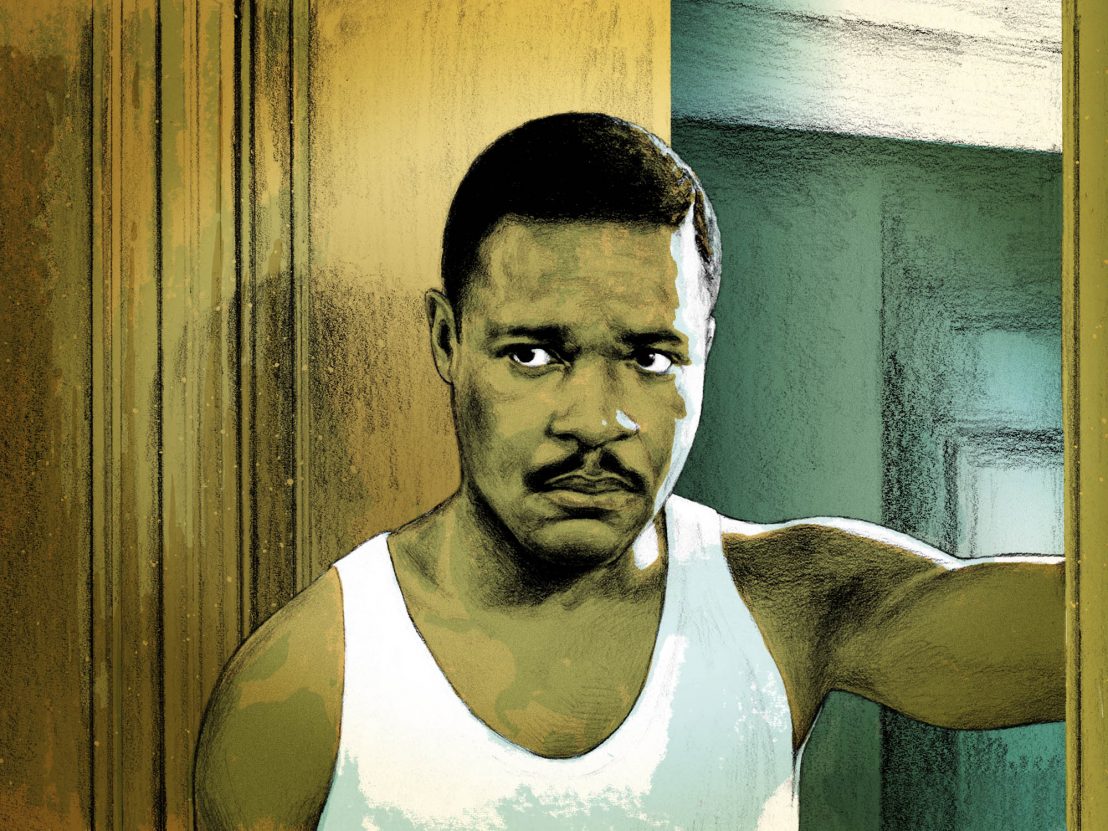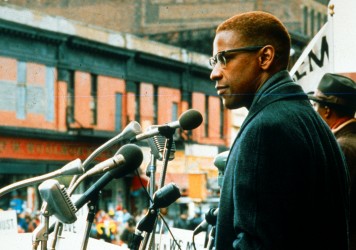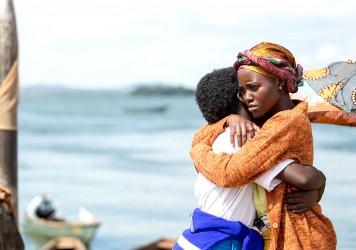
The star of A United Kingdom talks frankly and openly about the importance of faith in life and work.
Amma Asante’s A United Kingdom dramatises a historically significant love story between a white woman and a black man. She was Ruth Williams (Rosamund Pike), an English insurance clerk. He was Seretse Khama (David Oyelowo), heir to the kingdom of Bechaunaland (now Botswana). Beginning in the 1940s, the film shows how everyone from family members to the South African government pressurised the pair to separate.
British actor, David Oyelowo has the poise to play men standing tall amid raging bigotry. He does so in A United Kingdom, and he did so, most memorably, as Martin Luther King in Ava DuVernay’s Selma. The roles that he chooses connect to the fact of racism persisting in existing in this world. He talked to us in compelling detail about the private meaning – in the form of Christian faith and familial love – that enables him to withstand the storms of life.
LWLies: There’s a quote in A United Kingdom: “Let us not allow the ugliness of this world to take our joy away from us.” To what extent does having faith enable you to take a philosophical view of things that are destructive?
Oyelowo: I have a wife who I’m desperately in love with. We’ve been married for 18 years and I have four children who are my everything, and they are a big means of putting aside the ugliness of this world. All you have to do is turn on the news to be steeped in the ugliness of this world, but when I hug my daughter and when I look into the eyes of my sons and am anywhere near my wife, a lot of that fades away and I’m filled with hope and filled with joy and filled with the best of what it is to be alive. The best of us is to love and be loved. That’s my primary source of pushing that stuff aside.
Sometimes if you have something like a cocoon, things not being that way elsewhere can be a shock to the system, but you find that it protects or empowers you in some way?
Well, it gives me hope and it gives me belief in us as human beings. I’m also a Christian and that’s a big part of my life. It’s a big reason why I think I’m able to be the kind of father I aspire to be, and the kind of husband that I aspire to be – which is one who is self-sacrificial. Christianity is a religion that is built on self-sacrifice and when I am able to do that, and when I feel that from other people… A lot of the ugliness in the world is to do with people who are being self-serving, people who are – on the basis of prejudice or greed or whatever is – taking from other people. Love is flowing in the opposite direction. And so, between my faith and what it speaks to me about, and my relationship with God, and my relationship with my family, I am consistently in a state of what sacrificial love feels like. My hope in the human experience is topped up, even though I am surrounded by evidence that we are not always the best at what we can be.
Were you raised to have faith and to believe in the Bible?
I was raised in the church, but in my teenage years I just didn’t believe in it. I was piggy-backing on my parents’ faith. I was more of a cultural Christian than one who had a real faith. I made the mistake at the age of 16 of saying, ‘God, whoever you are, if you’re out there, I’m going to go to a different church because I find mine so boring I want to kill myself. I’m going to a different church and you have three months to turn up for me‘ All I can say to you is that, really beyond my expectation, that happened. I had an encounter with God that transcended the Bible. It went on to be something I just couldn’t shake, and trust me I tried, because it cut across my own understanding of what God is and faith is. It was outside The Bible. It was outside of all the norms of what I had perceived religion, Christianity to be. It was a personal infusion of the notion that I was loved in a way that could not be circumvented by anything I could do. It floored me and I was never able to turn away from that realisation and revelation.
What form did that realisation and revelation take?
In all honesty, it was an audible voice. I felt I heard a presence say to me, ‘There is nothing you can do to make me love you less.’ I felt that if God, as I understood him to be at that point, was the judgmental, obstinate, confusing entity that I thought him to be, if that had been what was revealed to me, it would have given me the fantastic and perfect excuse to run in the opposite direction – which is what I wanted to do – but all I felt was love.
How do you incorporate abstract beliefs into the practical business of living?
Well, a relationship can only be conducted if you are relating to the individual. My faith went from being something that was rooted purely in religious ritual and tradition to an interpersonal relationship. I spoke to God. Anyone who has been in any kind of functioning relationship knows that the more you talk, the more you get to know each other, the more you want to be with each other. That’s basically what it was for me. It wasn’t a dogmatic religious practice of praying a certain set amount of times a day, or at a certain hour, it was just an ongoing dialogue that started at the age of 16 and has carried on all the way till now.
When you wanted to run away from it, why did you want to run away from it?
I wanted to be off having sex with girls and playing football on a Sunday, instead of being in church and doing all those things that I thought God, judgementally, didn’t want me to do. Because he was stern and not much fun. What happened is I then realised that actually my best interests are what are at heart. If I had gone on to conduct my life the way I wanted to I wouldn’t have four beautiful children. I wouldn’t have married the woman I did because I would have made choices that flew in the face of getting married at the age of 22, having met someone who shared my values and my faith, and who really was, to my mind, a gift from God.
It sounds like a discipline that keeps you from sliding off into different directions according to your whimsy. Is that fair?
The by-product is discipline, but it’s like anything – if you love doing something, if you love the life that something gives you, it’s not a chore. If I love being around my wife, going on a date night with her or watching a movie with her or having a conversation with her doesn’t become a point of discipline. It’s just something I enjoy because it edifies me. And that’s the same in terms of my relationship with God. Yes, there’s a discipline to it, in that you’ve got to try and make sure that you don’t take the relationship for granted and that you keep on nourishing that relationship. But if, like I say, you love that person and you love how they make you feel, then it’s just something you do because it feels natural.
Wow. Erm. It sounds so perfect. Not perfect, but it sounds like you know what you want.
It’s simpler than we like to think. It’s too simple. That’s what threw me. ‘What? There’s nothing I can do to make you love me less, and that’s it? We’re not going to go into some big diatribe. I’m not going to have a burning bush or a Red Sea part. It’s going to be literally as simple as that?’ And it’s remained as simple as that. You talked about that line earlier from the film. ‘Let us not allow the ugliness of this world to steal our joy away from us.’ That – like you say – is huge, but it’s very simple. I think the greatest truths that we ever experience are very simple. We’re the complicated one. We’re the ones who want to complicate it because we can’t take things on face value because sometimes we struggle with the notion that we are worthy of love. What – there’s no conditions here? There’s nothing I have to do? I don’t have to have a sacrificial lamb or anything like that? No – it’s a simple as that. I love you. Done.
Do you think that it’s an important thing within a loving relationship to be joined together by a specific purpose?
Yeah, and obviously it doesn’t need to be as lofty as going up against governments, cultures, politics and all that kind of stuff. If you can find someone with whom you are unified spiritually, emotionally, intellectually, physically, inevitably you are going to want to go in the same direction. You are going to find similar things egregious. You are going to find similar things worthy of fighting for. That in and of itself builds your love for each other: a) you have things in common b) you both together can go up against them, and c) through that struggle you grow closer together because you are making each other better. The Bible says one can put a thousand to flight. Two can put ten thousand to flight. When you’re with someone who you love and have a common goal with they make you better because they are encouraging you to be your best self and hopefully you’re doing the same for them.
Were there people that you were attracted to that weren’t right for you, because – it’s like you say – things are simple, but things are only simple when they’re in place and when you don’t know if someone’s right for you that’s confusing. Did you experience that?
Oh absolutely. I mean, that’s why I didn’t marry them. And also, I should make it clear, that getting married at a young age, which is what I did, was not on the table for me at all. My dad didn’t get married until he was 40, didn’t have me until he was 42. My dad’s my hero. I was not in a rush to get married to anyone. I had had relationships with people I didn’t envisage spending my life with. They were not perfect scenarios. We weren’t simpatico in a way that felt like that was the way to go. I was taken aback at the age of 18/19 when I met Jessica that I had met someone with whom I felt so much affinity. By the time we got married at the age of 22 I couldn’t imagine my life without her in it, which also took me aback. I was just graduating from drama school. I had not worked a day as a professional actor. We had no money. Everything about our lives suggested insecurity, and that was the opposite of what I wanted going into marriage. But I just couldn’t, I couldn’t… I couldn’t understand several more days without us going through our lives as a unit and I was just very blessed to have that happen to me early in life.
What do you love about movies?
I love the fact that movies are a huge means of holding a mirror up to us as human beings. They reflect our humanity back to us. They shape culture. They educate. Of course, they entertain as well, but the primary thing is I think they help document who we are and how we are and where we’re at.
Published 10 Nov 2016

The likes of Sidney Poitier and Denzel Washington are being celebrated via a nationwide programme of events.

Chess gets the Disney sports movie treatment in this likeable tale of strategy and empowerment from Mira Nair.